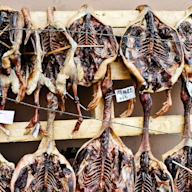Search results
Oct 23, 2009 · Traditions. Symbols. Traditional Foods. Chinese New Year celebrations were born out of fear and myth. Legend spoke of the wild beast Nian (which also is the word for “year”) that appeared at...
Feb 5, 2024 · February 05, 2024. Celebrated around the world, it usually prompts the planet’s largest annual migration of people. And though it is known to some in the West as Chinese New Year, it isn’t...
In 2024, Lunar New Year will fall on Saturday, February 10th and start a year of the Dragon. The Origin of Lunar New Year. Lunar New Year has enjoyed a history of about 3,500 years. A very old legend about Lunar New Year is still popular even today. A monster named Nian would attack villagers every Lunar New Year's Eve.
Chinese New Year has a history of about 3,500 years. Its exact beginning date is not recorded. Some people believe that Chinese New Year originated in the Shang Dynasty (1600–1046 BC), when people held sacrificial ceremonies in honor of gods and ancestors at the beginning or the end of each year.
Apr 15, 2019 · Chinese New Year has a far-reaching history of over 3,800 years. The origin of the festival can be traced back to the worshiping activities in China’s ancient agrarian society. The date for the ceremony wasn’t fixed till the Han Dynasty (202 BC - 220 AD), when Emperor Wudi commanded to use the lunar calendar.
Feb 1, 2022 · The history of Chinese New Year is intertwined with ancient agrarian society. Though the date of its exact beginning is not recorded, it probably began during the Shang dynasty (1600-1046 BC), when people held special ceremonies at the beginning and end of each year in accordance with the seasonal agricultural planting cycle.
Dec 6, 2023 · Also called the Spring Festival (春节 Chūnjié), the Chinese New Year celebrates the beginning of the Chinese year based on the traditional Chinese lunisolar calendar and officially ends 14 days later with the Lantern Festival.





















